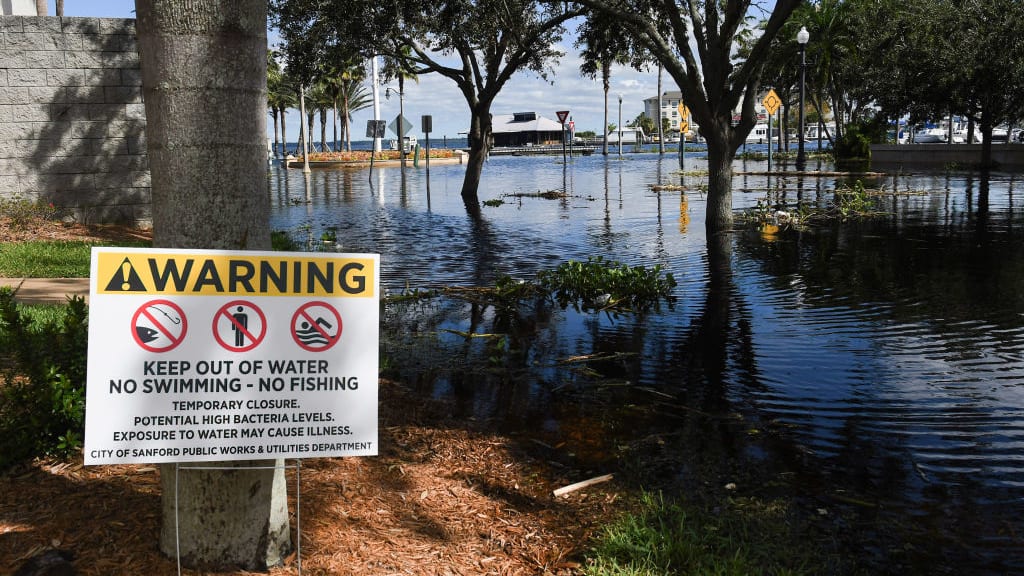Florida officials warn of spike in potentially deadly skin infections after Hurricane Ian


A free daily email with the biggest news stories of the day – and the best features from TheWeek.com
You are now subscribed
Your newsletter sign-up was successful
Public health officials in Lee County, Florida, are warning of a spike in potentially deadly infections caused by Vibrio vulnificus.
Hurricane Ian made landfall in Lee County on Sept. 28, and the storm surge and flooding led to the increase in infections, CBS News reports. Vibrio vulnificus is a species of bacteria that lives in warm, brackish seawater. People normally come in contact with it through raw or undercooked seafood, and it can also enter the body through cuts and other open wounds. Once the bacteria enters the bloodstream, it can cause sepsis.
The bacteria is also sometimes referred to as being "flesh-eating," CBS News says, because "primary infections of the skin can devolve quickly into necrotizing fasciitis," which is a rare condition where the body's tissue begins to break down. This often leads to amputation.
The Week
Escape your echo chamber. Get the facts behind the news, plus analysis from multiple perspectives.

Sign up for The Week's Free Newsletters
From our morning news briefing to a weekly Good News Newsletter, get the best of The Week delivered directly to your inbox.
From our morning news briefing to a weekly Good News Newsletter, get the best of The Week delivered directly to your inbox.
In a statement, a spokesperson for the Florida Department of Health in Lee County told CBS News it is "observing an abnormal increase in cases of Vibrio vulnificus infections as a result of exposure to the flood waters and standing waters following Hurricane Ian," and residents should "always be aware of the potential risks associated when exposing open wounds, cuts, or scratches on the skin to warm, brackish, or salt water."
As of Friday, there have been at least 29 cases of Vibrio vulnificus infections in Lee County this year, with all but two cases diagnosed after Hurricane Ian.
A free daily email with the biggest news stories of the day – and the best features from TheWeek.com
Catherine Garcia has worked as a senior writer at The Week since 2014. Her writing and reporting have appeared in Entertainment Weekly, The New York Times, Wirecutter, NBC News and "The Book of Jezebel," among others. She's a graduate of the University of Redlands and the Columbia University Graduate School of Journalism.
-
 Quentin Deranque: a student’s death energizes the French far right
Quentin Deranque: a student’s death energizes the French far rightIN THE SPOTLIGHT Reactions to the violent killing of an ultra-conservative activist offer a glimpse at the culture wars roiling France ahead of next year’s elections.
-
 Secured vs. unsecured loans: how do they differ and which is better?
Secured vs. unsecured loans: how do they differ and which is better?the explainer They are distinguished by the level of risk and the inclusion of collateral
-
 ‘States that set ambitious climate targets are already feeling the tension’
‘States that set ambitious climate targets are already feeling the tension’Instant Opinion Opinion, comment and editorials of the day
-
 Scientists are worried about amoebas
Scientists are worried about amoebasUnder the radar Small and very mighty
-
 A Nipah virus outbreak in India has brought back Covid-era surveillance
A Nipah virus outbreak in India has brought back Covid-era surveillanceUnder the radar The disease can spread through animals and humans
-
 Trump HHS slashes advised child vaccinations
Trump HHS slashes advised child vaccinationsSpeed Read In a widely condemned move, the CDC will now recommend that children get vaccinated against 11 communicable diseases, not 17
-
 Deaths of children under 5 have gone up for the first time this century
Deaths of children under 5 have gone up for the first time this centuryUnder the radar Poor funding is the culprit
-
 A fentanyl vaccine may be on the horizon
A fentanyl vaccine may be on the horizonUnder the radar Taking a serious jab at the opioid epidemic
-
 Health: Will Kennedy dismantle U.S. immunization policy?
Health: Will Kennedy dismantle U.S. immunization policy?Feature ‘America’s vaccine playbook is being rewritten by people who don’t believe in them’
-
 More adults are dying before the age of 65
More adults are dying before the age of 65Under the radar The phenomenon is more pronounced in Black and low-income populations
-
 Ultra-processed America
Ultra-processed AmericaFeature Highly processed foods make up most of our diet. Is that so bad?
